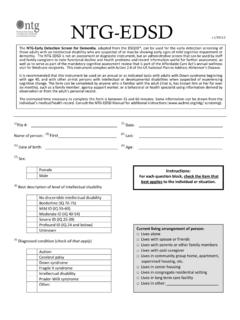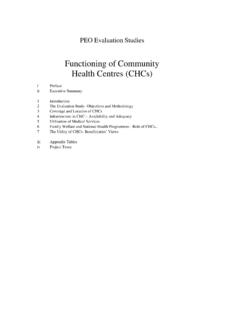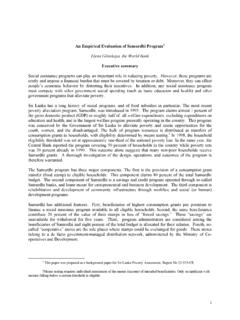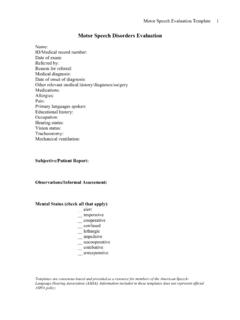Transcription of Moran, JA et al - aadmd.org
1 Moran, JA et al Word count: 5529. Number of tables: 3. Number of Supplemental Tables: 3. Number of references: 41. The National Task Group on Intellectual Disabilities and Dementia Practices Consensus Recommendations for the evaluation and Management of Dementia in Adults with Intellectual Disabilities Authors: Julie A. Moran, DO1. Michael S. Rafii, MD, PhD2. Seth M. Keller, MD3. Baldev K. Singh, MD3. Matthew P. Janicki, PhD5. 1. Beth Israel Deaconess Medical Center, Division of Gerontology. Harvard Medical School, Boston, MA, USA. 2. University of California, San Diego School of Medicine, Department of Neurosciences, La Jolla, CA, USA.
2 3. American Academy of Developmental Medicine and Dentistry, USA. 4. Westchester Institute for Human Development, New York Medical College, Valhalla, NY, USA. 5. University of Illinois at Chicago, Chicago, IL USA. Financial support and disclosures: The authors have no disclosures Reprints and correspondence: Julie Moran, DO. Beth Israel Deaconess Medical Center Division of Gerontology 110 Francis Street LMOB 1B. Boston, MA 02215 USA. Telephone: +1 617-435-6798. Email: Abbreviations: I/DD: Intellectual and Developmental Disabilities NTG: National Task Group on Intellectual Disabilities and Dementia Practices 1.
3 Moran, JA et al Acknowledgements: This document represents the collective efforts of many members of the National Task Group on Intellectual Disabilities and Dementia Practices, with the lead for organizing, synthesizing and producing the information attributed to the authors. The NTG is indebted to the NTG members who offered comments, suggestions, and recommendations. Support for these efforts has been provided by the American Academy of Developmental Medicine and Dentistry and by Grant # H133B080009 to the Rehabilitation Research and Training Center on Aging and Developmental Disabilities - Lifespan Health and Function at the University of Illinois at Chicago from the Department of Education, National Institute on Disability and Rehabilitation Research.
4 Abstract: Adults with intellectual and developmental disabilities (I/DD) are now regularly reaching old age, and are increasingly presenting to their health care providers with concerns related to growing older. One particularly challenging clinical question is related to the evaluation of suspected cognitive decline and potential dementia in older adults with I/DD, a question that most physicians feel ill-prepared to answer or address. The National Task Group on Intellectual Disabilities and Dementia Practices (NTG) was convened to help formally address this topic, which remains largely underrepresented in the medical literature.
5 The task group, comprised of specialists who work extensively with adults with I/DD, has promulgated the following Consensus Recommendations for the evaluation and Management of Dementia in Adults with Intellectual Disabilities as a framework for the practicing physician who seeks to approach this clinical question practically, thoughtfully, and comprehensively. 2. Moran, JA et al Introduction: The National Task Group (NTG) on Intellectual Disabilities and Dementia Practices The National Task Group (NTG) on Intellectual Disabilities and Dementia Practices was formed as a response to the National Alzheimer's Project Act (NAPA), legislation signed into law by President Barack Obama.
6 One objective of the NTG is to highlight the additional needs of individuals with intellectual and developmental disabilities who are affected or will be affected by Alzheimer's disease and related disorders. The American Academy of Developmental Medicine and Dentistry (AADMD), the Rehabilitation Research and Training Center on Aging with Developmental Disabilities-Lifespan Health and Function at the University of Illinois at Chicago, and the American Association on Intellectual and Developmental Disabilities (AAIDD), combined their efforts to form the NTG to ensure that the concerns and needs of people with intellectual disabilities and their families, when affected by dementia, were and continue to be considered as part of the National Plan to Address Alzheimer's Disease1 issued to address the requirements of NAPA.
7 Among the NTG's charges were the (a) creation of an early detection screen to help document suspicions of dementia-related decline among adults with intellectual disabilities, (b) development of practice guidelines for health care and supports related to dementia among adults with intellectual disabilities, and (c) identification of models of community-based support and long term care of persons with intellectual disabilities affected by dementia. In 2012, the NTG issued, 'My Thinker's Not Working': A National Strategy for Enabling Adults with Intellectual Disabilities Affected by Dementia to Remain in Their Community and Receive Quality Supports.
8 2. A subgroup of the task group was formed to focus specifically on health practices. The guidelines and recommendations outlined in this document represent the consensus reached amongst said specialists at two plenary meetings and ongoing discussions that followed, informed by review of current literature and drawn from each specialist's clinical practice, and thus meet level 2 (case-controlled studies) and level 3. (observational studies) for evidence in clinical application. These guidelines are a suggested starting point as we develop more formal methodologies to determine best- practices of evaluation of dementia in this population.
9 Background Adults with intellectual and developmental disabilities (I/DD) are now regularly living into old age, with many surviving into their 70s, 80s and beyond. Dementia is among the most clinically challenging co-occurring conditions of aging among a select group within this population ( , those adults with Down syndrome and those with brain 3. Moran, JA et al injury), considering that the approach to evaluation , diagnosis, treatment, and management of dementia in adults with I/DD remains largely undefined in the literature. It has been well established that adults with I/DD experience poorer health outcomes compared to the general population, a trend seen in mortality, morbidity, and quality of , 4 The cause of this disparity is complex and multifactorial, but poor training and preparedness among health care providers nationwide ranks among the key contributing factors.
10 Formal didactic training on adults with I/DD throughout the lifespan is not routinely incorporated into medical school or residency Recognizing these existing disparities in medical training and health care services for adults with I/DD, the National Task Group on Intellectual Disabilities and Dementia Practices organized a targeted effort to help address this gap. The goal of this paper is to clarify key principles of evaluation and management of dementia in adults with I/DD. (which, for the purpose of this paper, refers to individuals 20 and older), based on evidence-based research as well as consensus among experts within the NTG.






